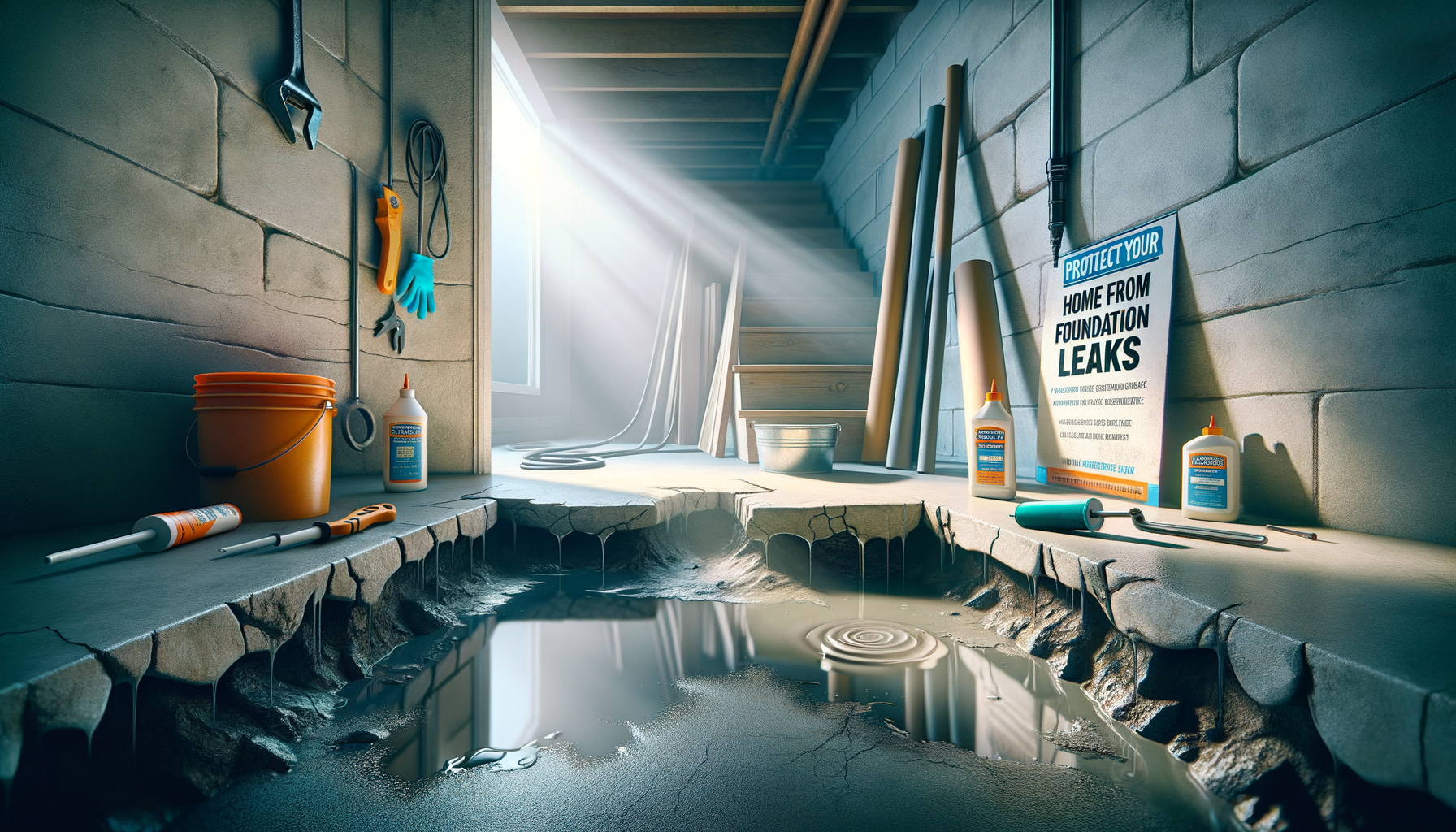Introduction
Imagine this: it’s a rainy Sunday afternoon, and you’re relaxing with a book. Suddenly, you spot a damp patch spreading on your basement floor. At first, you think it’s just a small spill, but it turns out to be a serious foundation leak.
Fixing a foundation leak quickly is super important to keep your home safe. Ignoring even small leaks can lead to big problems, expensive repairs, and health risks like mold. In this article, we’ll learn how to spot foundation leaks, fix them yourself or with help, and prevent them from happening.
Recognizing the Signs of a Foundation Leak
What to Look For
- Cracks in the walls or floors: Small cracks can be normal, but big, jagged, or spiderweb-like cracks might mean a problem.
- Damp spots or water puddles: Puddles of water or always-damp areas are warning signs.
- Mold and mildew: These grow in wet places and might mean water is getting in.
Other Clues
- Strange smells: Musty odors often come with mold in areas with a leak.
- Increased humidity in the basement: If the air feels more humid, it might be moisture from a leak.
- Doors and windows that stick: This could mean the foundation is shifting.
Causes of Foundation Leaks
Pressure from Soil and Water
- Water pressure from the ground: When the soil around your home gets soaked, it can push water through cracks.
- Expanding soil: Some soils swell when wet, putting pressure on the foundation.
Construction Problems
- Bad drainage systems: Poor drainage can make water build up around the foundation.
- Not enough waterproofing: Skimping on waterproofing during construction can leave the foundation open to leaks.
Environmental Factors
- Heavy rain or flooding: Too much water from storms can overwhelm drainage systems.
- Temperature changes: Freeze-thaw cycles can make cracks in the foundation.
What to Do When You Find a Foundation Leak
Safety First
- Turn off electricity if needed: If water is near electrical systems, switch off the power to stay safe.
- Check the area’s safety: Make sure the place is safe to enter.
Quick Damage Control
- Remove standing water: Use a wet/dry vacuum or mop to clean up water.
- Dry out the area: Use fans and dehumidifiers to prevent more damage and mold.
Take Notes and Photos
- Document the damage: Take pictures and write notes for insurance claims or repair estimates.
DIY Repair Methods for Minor Foundation Leaks
Fixing Small Cracks
- Use hydraulic cement or epoxy injections: These materials fill and seal small cracks.
- Apply waterproof sealants: These create a waterproof barrier over repairs.
Improve Drainage
- Keep gutters and downspouts clear: Make sure water flows away from your home.
- Install or upgrade French drains: These help direct water away from the foundation.
Interior Waterproofing
- Use waterproof paints and membranes: These add extra protection inside your home.
- Set up a sump pump: This can help remove extra water from your basement.
When to Call the Professionals
Major Problems
- Large or many cracks: Big cracks or lots of small ones mean you need professional help.
- Big foundation shifts: If you see serious settling, call a pro.
- Persistent water issues: If DIY fixes don’t work, it’s time for professional repair.
Professional Repair Options
- Wall stabilization: Pros can reinforce walls that are bowing or cracking.
- Exterior waterproofing: Strong protection from the outside.
- Foundation underpinning: Strengthening the foundation with additional support structures.
Preventing Future Foundation Leaks
Regular Maintenance
- Inspect the foundation regularly: Catch problems early to avoid big issues.
- Maintain drainage systems: Ensure they’re clean and working well.
Landscaping Tips
- Grade your yard to slope away: This helps direct water away from the foundation.
- Plant trees and shrubs wisely: Keep them at a safe distance to avoid root problems.
Home Upgrades
- Invest in waterproofing technologies: Modern products offer better protection.
- Update old plumbing: Leaky pipes can add to foundation moisture problems.
Conclusion
Foundation leaks need your attention quickly. Finding and fixing them early can save you from big damage and repair costs. While you can handle minor issues yourself, major problems need professional help. By taking care of your home and preventing leaks, you can keep your foundation solid and dry.
Additional Resources
FAQs
- What are the most common signs of foundation leaks? Cracks, dampness, and mold.
- Can I fix a foundation leak myself? You can handle minor leaks, but big cracks need professional repair.
Helpful Links
- Professional Foundation Repair Services
- DIY Home Repairs and Maintenance Guides


Leave a Reply